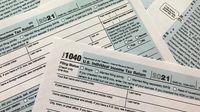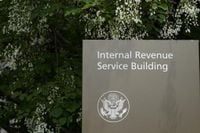The tax deadline is here, and for many Americans, April 15, 2025, is a day filled with anxiety and urgency as they rush to file their tax returns. However, for those who find themselves unable to meet this deadline, the Internal Revenue Service (IRS) provides options to ease the burden. Taxpayers can request an extension, granting them additional time to file their returns while still being responsible for any taxes owed.
Tax Day falls on Tuesday, April 15, 2025, with the deadline set at midnight in each taxpayer's respective time zone. For those who are scrambling to complete their taxes, the IRS offers an automatic tax-filing extension through IRS Free File Form 4868. This form can be submitted electronically or mailed, but it must be postmarked by today. It’s important to note that while an extension allows for more time to file, it does not extend the deadline for payment. Taxpayers are still required to pay any owed taxes by the April 15 deadline to avoid penalties.
As of April 4, 2025, approximately 100 million Americans had already filed their taxes, according to the IRS, which anticipates over 140 million individual tax returns will be submitted by the deadline. For those who need more time, an extension gives individuals an additional six months to file their federal return, moving the deadline to October 15, 2025. However, taxpayers must still pay what they owe by the original deadline to avoid incurring interest and penalties.
Taxpayers can make payments using several methods, including Direct Pay, debit or credit cards, or digital wallets. When making a payment, it’s crucial to indicate that the payment is for an extension. Failure to pay on time can result in financial penalties, and it’s worth noting that the IRS cuts the failure-to-pay penalty in half during the terms of a payment plan.
For those who owe less than $50,000, the IRS offers long-term payment plans that allow payments to be spread out over a decade. Short-term plans are available for those who owe $100,000 or less, granting an additional six months to settle their tax bills. However, interest and late-payment penalties will continue to accrue on amounts under a payment plan.
Taxpayers who file for an extension should remember that while they have more time to file their returns, they do not have more time to pay. Andy Phillips, vice president of the Tax Institute at H&R Block, emphasized this point, stating, "If you do need more time past April 15, it's crucial to request an extension. The penalty for failing to file on time is up to 10 times the penalty for just failing to pay on time." This means that filing an extension is a wise choice for those who need extra time to gather their documents and complete their returns.
Moreover, taxpayers who are expecting a refund should still consider filing for an extension. Lisa Greene-Lewis, a CPA and editor of the TurboTax blog, explained that even if one anticipates a refund, it’s important to file an extension to ensure the IRS has the correct information regarding deductions and credits. She noted, "You do still want to file an extension even if you're going to get a refund because the IRS, they don't know your deductions and credits."
For those living in states affected by natural disasters, the IRS has extended the tax deadline. Taxpayers in Alabama, Florida, Georgia, North Carolina, South Carolina, and certain areas in Alaska, New Mexico, and Virginia now have until May 1, 2025, to file their returns. Additionally, residents of California's Los Angeles County have until October 15, 2025, while those in Arkansas, Kentucky, Tennessee, and specific counties in West Virginia have until November 3, 2025.
As the clock ticks down to midnight, the urgency for many taxpayers increases. For those who have all their documents ready, experts recommend filing as soon as possible rather than waiting until the last minute. Greene-Lewis advised, "If you're ready to go and have all your documents, there's no reason to wait any longer. Make sure you file today." With the average refund exceeding $3,000, there’s a strong incentive for taxpayers to complete their filings promptly.
In summary, the tax deadline is a significant date for many Americans, and while the pressure to file can be overwhelming, the IRS provides various options for those needing more time. By understanding the rules surrounding tax extensions and payment obligations, taxpayers can navigate this stressful period more effectively. Whether filing on time or requesting an extension, the key takeaway is clear: pay any taxes owed by April 15 to avoid penalties, and don’t hesitate to seek help if needed.







